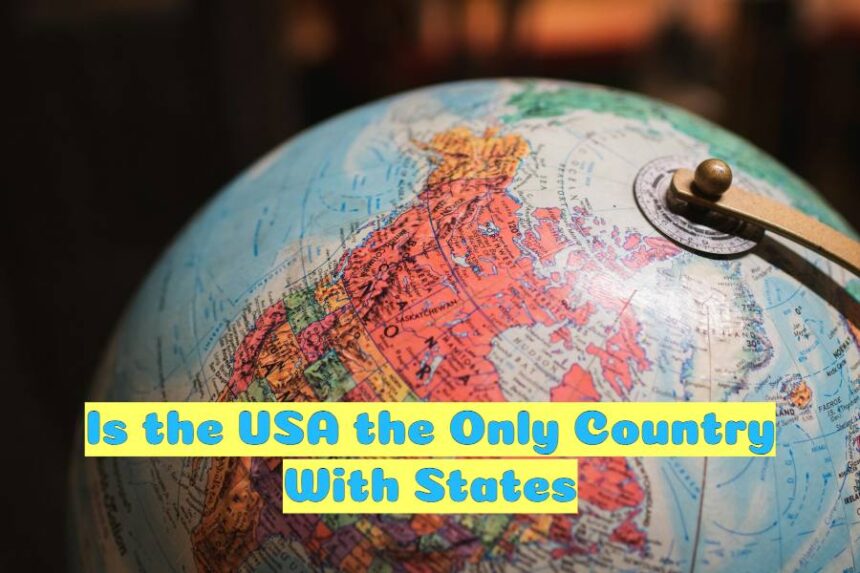No, the USA is not the only country with states. Many countries, such as Mexico and Germany, also have states.
- Breaking Down Statehood
- Usa’s Framework Of States
- States Beyond The American Borders
- Diving Into State-like Entities Worldwide
- Dispelling The Myths
- Implications Of Misunderstanding Statehood
- Frequently Asked Questions Of Is The Usa The Only Country With States
- Do Other Countries Besides The Us Have States?
- Which Country Has Most States?
- What Country Has 50 States?
- Are The States Technically Their Own Country?
- Conclusion
The concept of states within a country is common in federal systems, where individual regions possess a certain level of autonomy and governance. The United States is widely recognized for its state system, comprising 50 states, each with its own government and constitution.
This structure allows for a balance between national governance and local needs, providing a diverse range of cultural, legal, and economic environments within a single nation. Countries like Brazil, Australia, and India similarly utilize a state system to manage and distribute regional powers and responsibilities. Effective governance across vast geographies benefits from this method, which supports local legislation while upholding a unified federal framework. This decentralized approach can enhance responsiveness to regional issues and provide tailored solutions to meet the specific needs of disparate communities.
Breaking Down Statehood
Statehood often stirs thoughts of governance, autonomy, and political identity. Yet, what defines a state extends well beyond the borders of the United States. Many countries globally organize their territories with names such as states, provinces, or regions. Let’s explore the universal notion of ‘state’ and compare how various countries structure their subnational entities.
Defining ‘state’ In Global Context
The term ‘state’ carries varied meanings depending on the country’s context. Internationally recognized, a state is a political entity with sovereignty over its territory, having a government, permanent population, and the capacity to enter into relations with other states. Within a nation, however, a ‘state’ may not possess all these attributes of sovereignty but still retains significant governmental responsibilities.
State Vs Province Vs Region
Understanding the nuances between states, provinces, and regions helps clarify the geopolitical landscape. Here’s a snapshot:
| Entity | Description | Examples |
|---|---|---|
| State | An administrative division with its own government | USA, Mexico, Brazil |
| Province | Similar to a state, used in some countries | Canada, Italy, South Africa |
| Region | A broader term that can indicate administrative or cultural divisions | France (administrative), Italy (cultural) |
In Canada, ‘provinces’ have their own constitutions, whereas ‘territories’ have governance provided by the federal level. Italy’s regions have their distinct flavors and autonomy, making the country’s landscape diverse. Federal nations like the USA empower their states with significant legislative authority, often reflecting the country’s founding ethos of decentralization.
Usa’s Framework Of States
The United States of America is renowned for its unique structure. This structure combines 50 diverse states under a single national government. Each state boasts its own government, laws, and individuality. Yet, they unite to form the larger country we know as the USA. Let’s dive deep into how this framework operates and what it looks like.
The U.s. State System
In the U.S., the state system is more than just a geographical division. It’s a complex but well-oiled machine that balances governance across the nation. Each state has its own constitution, providing a blueprint for its laws and government. This system supports cohesion and variety within the country. States range from populous ones like California to more tranquil places like Wyoming.
Autonomy And Federalism In The Usa
The key to the USA’s state system is autonomy and federalism. Autonomy gives states the power to make their own laws on many subjects. These include education and public safety. Federalism is the tie that binds these autonomous states together. It defines the shared control and responsibilities between the national and state governments. This delicate balance between state independence and central authority is central to the U.S. political system.
States Beyond The American Borders
Imagine a world map. Your eyes might first land on the USA, a country known for its states, like Texas or California. But look again. There is more to explore. The world is full of places with states. Let’s take a journey beyond the American borders to discover them.
Countries With Similar Structures
Countries often mirror the USA’s state system. They use this system to manage land and people better.
- Germany calls its states ‘Bundesländer‘.
- Australia divides itself into states and territories.
- In India, states and union territories form its structure.
- Brazil is a vast land with 26 states.
Unique Names For Administrative Divisions
Other countries use different names. These names can be very interesting. Let us look at a few examples.
| Country | Administrative Division |
|---|---|
| Canada | Provinces and Territories |
| France | Regions and Departments |
| Japan | Prefectures |
| Russia | Federal Subjects |
Diving Into State-like Entities Worldwide
Many people think the United States is unique in having states. Yet, this concept isn’t one of a kind. Other countries also break down into smaller geographical units. Some countries call these areas states, while others have different names. Let’s explore these state-like entities across the globe.
Examples Of States In Other Nations
Many nations have regions that function like US states. These areas have their own local governments and laws.
- Germany: Known as Bundesländer, each has its own constitution.
- Australia: Their states and territories come with distinct parliaments.
- India: Each state boasts a government that runs under the national constitution.
- Brazil: States have their own governors and legislatures.
- Nigeria: It’s divided into states with significant local autonomy.
- Russia: Here, they’re referred to as federal subjects, including republics and territories.
Comparing Authority And Governance
Different countries grant different powers to their states or state-like entities. These local governments may handle education, law enforcement, and transportation. National governments usually control foreign policy and defense.
| Country | Local Entity | Area of Governance |
|---|---|---|
| Germany | Bundesländer | Education, Policing |
| Australia | States and Territories | Health, Transport |
| India | States | Agriculture, Water |
| Brazil | States | Taxation, Infrastructure |
In most cases, a balance of power exists. This balance ensures both local and national interests are met. Understanding these relationships helps us appreciate the global diversity in governance.
Dispelling The Myths
Is the USA indeed the solitary nation composed of states? This common belief has fogged international civics dialogue for years, creating a blurry image of global governance structures. To clarify this misconception, let’s dive into the facts, breaking down myths and emphasizing the need for precise language concerning the geopolitical subdivisions of countries around the world.
Common Misconceptions
Many believe the term ‘state’ is exclusive to the USA.
- Some think all countries are divided into provinces or regions, not states.
- Others assume that the word ‘state’ implies a federal system like in the USA.
- A few even believe that U.S. states have unique governmental powers unmatched globally.
This confusion steers the dialogue away from understanding different nations’ structures. Countries like Mexico, Brazil, and Australia also organize their territories into states. They too have governments with roles defined at both the federal and state level.
The Importance Of Accurate Terminology
Clear communication relies on using precise terms. Calling all subnational units ‘states’, regardless of their true structure, muddles understanding. For example:
| Country | Subnational Division |
|---|---|
| Germany | Länder (Federal States) |
| Canada | Provinces and Territories |
| France | Régions |
| India | States and Union Territories |
Such distinctions are critical in international discourse, aiding comprehension and diplomatic engagement. Understanding correct terminology reflects respect for each nation’s governance and promotes informed global citizenship.

Credit: www.americanprogress.org
Implications Of Misunderstanding Statehood
The idea of ‘statehood’ often brings to mind the United States, renowned for its 50 unique states. Yet, the United States is far from the only country structured with states. Countries like Australia, Mexico, Brazil, and India also operate under a federal system consisting of states or equivalent entities. Understanding this is crucial, as misconceptions about statehood can lead to significant misunderstandings on the global stage.
Impact On International Relations
Misinterpreting the concept of statehood can have profound repercussions in the realm of international diplomacy. A clear grasp of different countries’ political units is essential for establishing respectful and effective global partnerships.
- Political Embarrassments: Mistakes in recognizing states could result in diplomatic blunders.
- Negotiation Confusion: Misunderstanding the powers of a state could derail international agreements.
- Travel Mix-ups: Misidentifying states may cause issues in visa processes and international travel.
Educational Reforms To Address Confusion
Education plays a vital role in correcting misconceptions about statehood. By reforming curriculums to better explain the concept of statehood, clarity can be achieved.
Here is an outline of potential educational reform strategies:
- Global Political Systems: Incorporating lessons on different countries’ state structures.
- Interactive Learning: Using technology to simulate governance in different federal systems.
- Case Studies: Examining real-world examples to illustrate the impact of states within countries.
These changes aim to ensure that individuals have a robust understanding of the political landscape beyond their borders.

Credit: www.amazon.com
Frequently Asked Questions Of Is The Usa The Only Country With States
Do Other Countries Besides The Us Have States?
Yes, countries like Australia, Brazil, India, Mexico, and Nigeria also organize their nations into states. Each state has its own local government and specific powers.
Which Country Has Most States?
India is the country with the most states, boasting a total of 28.
What Country Has 50 States?
The United States of America consists of 50 states. Each state has its own government and specific jurisdiction. The USA’s vast landscape encompasses a variety of geographic features and climates, contributing to its rich diversity.
Are The States Technically Their Own Country?
No, states are not their own countries; they are political subdivisions within a larger sovereign nation, such as the United States.
Conclusion
Understanding the political landscape reveals that the USA isn’t alone in its state-based structure. Countries like Mexico and Australia also divide power regionally. This fosters local governance and cultural diversity. Remember, the term ‘state’ is versatile globally – an exciting tidbit for geography enthusiasts.
Keep exploring, as each nation’s unique framework shapes its identity.




